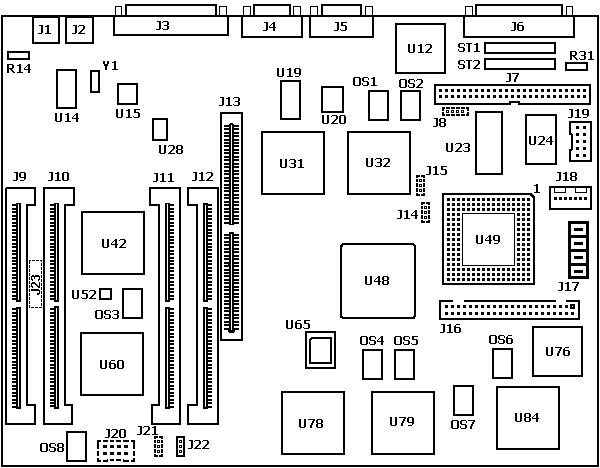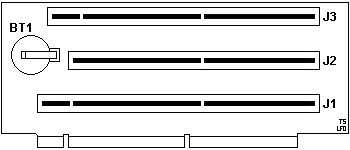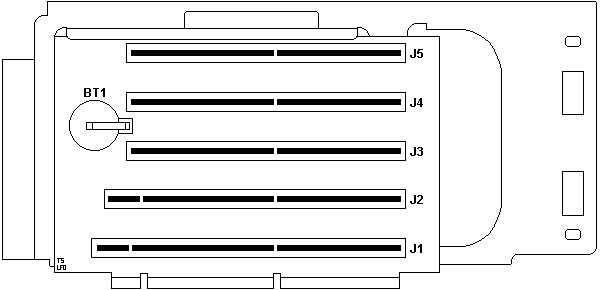|
7677ref.exe Model 76/77 Reference Disk v3.10 (zipped image)
rf7677a.exe Model 76/77 Reference Disk v1.1 (zipped image)
7677diag.exe Model 76/77 Diagnostic Disk v3.11 (zipped image)
rd7677a.exe Model 76/77 Advanced Diagnostics v1.1 (zipped image)
192-223 PS/2 76/77, Ultimedia M77, and 486-33/66 Microprocessor Upgrade Option
486 Interposers and Upgrades
ECP Support
Direct Cable Connection under 95
Bermuda Planar (9576/77)
System Firmware
ROM Images
Bermuda Versions
Bermuda Riser Cards
Built-in SCSI
Bermuda Overclock
Video
Bermuda Planar
SX: FRU P/N 39G2668
![Front 39G2668 [P]](/other/img/photo.gif) or 39G5698
or 39G5698
![Front 39G5698 [P]](/other/img/photo.gif)
![Back [P]](/other/img/photo.gif) | |
![Front 39G5698 (alt) [P]](/other/img/photo.gif)
![Back 39G5698 (alt) [P]](/other/img/photo.gif) or 87F4839
or 87F4839
![Front 87F4839 [P]](/other/img/photo.gif)
DX2: FRU P/N 39G2669 or 39G6086
![Front 39G6086 [P]](/other/img/photo.gif)
![Front 39G6086 (no CPU) [P]](/other/img/photo.gif) | |
![Back 39G6086 [P]](/other/img/photo.gif)

U76 This can be either a
82077AA,
82077SL, or
NS PC8477AV-2 floppy controller.
Planars with the 82077SL controller are rather rare and have the U65 System
EPROM 39G3299 soldered directly to the planar (no PLCC socket).
Early versions of the board (39G2668 and possibly 39G2669) lack two
additional 74xx ICs (U85 and U86) near the silver-capped IC (U84) and have a
bunch of bodge wires.
J8 - SCSI Diagnostic Port
| Pin | Description |
|---|
| 1 | RXD (U32 pin 45) |
| 2 | Ground |
| 3 | N/C (key) |
| 4 | TXD (U32 pin 93) |
Not populated. The port can be used to access the
Serial Console.
System Firmware (POST & BIOS)
Simplified firmware stored in EPROM. IML image required for the system to operate.
ROM Images
39G3299 - 03 Aug 1992, rev. 3, 1x 27C1001 PLCC32 (U65)
Bermuda Versions
There were several versions of the "Bermuda" board:
- (39F2668) 486SX (25/33 MHz jumperable) with "Upgrade CPU" socket
- (39G2669) 486DX (33 MHz only) with CPU in the "Upgrade socket"
- (39G5698) 486SX-33 MHz
- (39G6086) 486DX2-33/66 MHz
- (39G6444) 486DX2-33/66 special bid for Pinnacle CD-ROM Bootable Systems
Bermuda Riser Cards
Bermuda 76 Riser FRU 87F4833
The 76i bus adapter support (individual FRU) is 61G2289.
FRU 87F4833 is for the bracket alone.

BT1 CR2032
J1 32-bit MCA slot with Base Video Extension (BVE) (for XGA/XGA-2...)
J2 32-bit MCA slot
J3 32-bit MCA slot with Auxiliary Video Extension (AVE)
Bermuda 77 Riser FRU 87F4836
![Front [P]](/other/img/photo.gif)
The separate riser card (riveted onto bracket) is FRU 87F4836.
My HMM has the bracket/riser as FRU 87F4836. The bracket/riser is marked
with a sticker as P/N 39G2063

BT1 CR2032
J1 32-bit MCA slot with Base Video Extension (BVE) (for XGA/XGA-2...)
J2 32-bit MCA slot with Auxiliary Video Extension (AVE)
J3-5 32-bit MCA slots
Onboard SCSI
From Peter (edited):
The onboard SCSI is functionally the same as the
Spock Prime and from the most part
uses the exact same components. The 512 KB cache is implemented using a single
non-removable DRAM device. The SCSI BIOS is part of the machine BIOS stored in
a single EPROM. The SCSI code also included in the IML image.
If you look closely at the 9577 planar you will find some SMD transistor "of
the bigger kind" and some stuff that looks like auto-termination. In addition
the onboard SCSI adapter is described as "SCSI-2 compliant"... which extends on
the command set in the first place, the enhanced SCSI translation and on the
electric interface as well I think. But not on the speed of course, which is 5
MB/s SCSI-1 standard.
From IBM:
The SCSI controller is integrated in the planar so a slot is
not required.
Supports SCSI Common Command Set Version 4.B (SCSI-2 Compliant),
Attachment of up to 7 SCSI physical devices (internal and external), Allows
multiple SCSI initiators for device sharing, SCSI Data Transfer Rate - up to
5.0 MB/sec, Supports Synchronous and Asynchronous SCSI Data Transfers, Supports
disconnect/reconnect of SCSI targets, Automatic external SCSI bus detection
(disables internal planar terminator automatically), Slew rate controlled SCSI
drivers and filtered SCSI receivers for high data integrity.
Bermuda Overclock
From Peter Wendt:
I tried the oscillator swap (Ed.
OS5 80.000 MHz) on a "Bermuda" - with less success so far. The
system tries to come up but lands in a number of errors, from which the
"trivial ones" (162/163/161) are logically a symptom of the board removal
and a total loss of CMOS contents. But the machine comes up with a I9990021
- even with a proper ref-disk in A: it chokes on reading any other floppy.
Guess it is the same problem as with the Mod. 90/95.
I tried running the machine with a DX4-33/100 in 2x mode
(jumper on interposer), which is known to even work at 50MHz input clock.
No go. The cursor in the phase before memory count seems to blink a bit
faster... but then the machine hangs with I999-error after the count.
Configuring it properly and *then* swapping the oscillator (which is a
bit tricky) did not work either - ran into a solid I999 0022 (invalid IML).
Restoring system partition from diskettes also failed.
Conclusion: overclocking isn't a good idea, at least not with this. Any
other experiences?
CPU Upgrades
DX4100-ODPR works.
laburnam@my-deja.com:
I bought an Evergreen 586 CPU upgrade with an AMD P133 chip
on it. It made my PS/2 77 (9577-0UF) go noticeably faster, perhaps 15
to 25 percent quicker. No incompatibility problems - but McAfee Office
still rates my machine as a 486-33 (go figure!).
Video
Bermuda BVE Slot
On the 9576, Slot #1 is the BVE Slot, Slot #3 is the AVE slot.
Bermuda Planar ADF
Serial Port One: Choices are Serial
1 through Serial 16, or disabled. Standard interrupt levels are IRQ
4 for serial 1 and IRQ 3 for any other serial level.
Serial Port Two: Choices are Serial
1 through Serial 16, or disabled. Standard interrupt levels are IRQ
4 for serial 1 and IRQ 3 for any other serial level.
Parallel Port: Choices are Parallel
1 through 4 or disabled.
Note: IBM used a different IO address
for LPT1 of 03BC-03BF instead of the common 0378-037B. You may be better
off to set your parallel port to PARALLEL 2.
PARALLEL 1 (03bc-03bf 1278-127b int 7), 2 (0378-037b int 7),
3 (0278-027b int 7), 4 (1378-137b int 7), Disabled
Parallel Port DMA Arbitration Levels:
If the level is shared then other devices can use the same level.
If the level is dedicated then only this device can be set to that level.
Shared Level 7 - 0, Dedicated Level 7 - 0, and Disabled.
SCSI Address (ID): ID of the built-in
SCSI controller. Choices are ID7 through ID0. Under normal circumstances,
select <7>.
SCSI I/O Address: Select: I/O address
of built-in SCSI controller.
<3540h-3547h>, 3540-3547,
3548-354F, 3550-3557, 3558-355F, 3560-3567, 3568-356F, 3570-3577, 3578-357F
SCSI Fairness On/Off: Choices are
On or Off. Bus Arbitration Fairness controls whether the adapter will release
control of the bus when it has been using it exclusively. Under normal
circumstances, select <On>.
SCSI DMA Arbitration Level: Choices
are Level 1, 3, 5 through E. Selecting an arbitration level allows only
this device to use the value.
ADP Fields (System determined)
Alternate Processor: Type of CPU
installed in alternate processor socket on system board.
Current System Speed: Current speed
of the system, 25MHz or 33MHz.
System Board: System board type
|